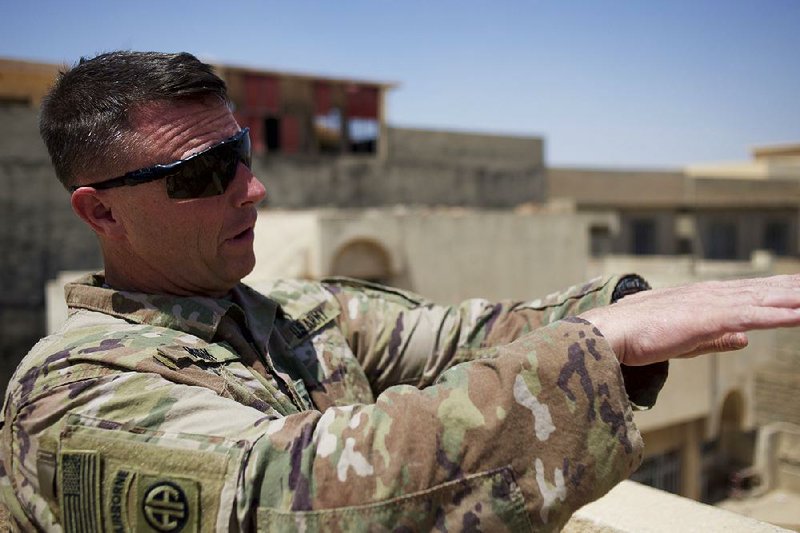MOSUL, Iraq -- The day after Iraq's prime minister declared an end to the Islamic State group's caliphate, U.S. Army Col. Pat Work and a small team of about a dozen soldiers drove through western Mosul in two unmarked armored vehicles to warn Iraqi forces of a pressing threat: friendly fire.
The American colonel had a series of urgent face-to-face meetings with generals from the Iraqi army, the federal police and the Iraqi special forces ahead of a major offensive Saturday morning to clear out the remaining Islamic State positions in Mosul.
American troops are taking on an increasingly prominent role in the fight. Once largely restricted to working in highly fortified Iraqi bases, U.S. commanders now travel in and around Mosul with small teams of soldiers, sharing intelligence and advising plans of attack, revealing how the U.S. role in Iraq has steadily deepened throughout the operation to retake the country's second largest city.
The gains in the Old City bringing Iraqi troops closer to victory against the Islamic State in Mosul have also meant the three branches of the country's security forces are now fighting in closer quarters than ever before.
Weaving in and out of civilian traffic along the city's main thoroughfares, thick plumes of black smoke from airstrikes and artillery were just visible on the horizon from Work's convoy. He explained that the new battle space and lingering communication shortcomings mean Iraqi ground troops are at increased risk of being hit by nonprecision fire like mortars and artillery launched by their partner Iraqi forces
"We're helping [Iraqi forces] see across the boundaries between their different units... just helping them understand where they are and how rapidly things might be changing," Work said.
Throughout the course of the day Work shuttled between bases, meeting with Iraqi commanders deep inside Mosul. While the U.S.-led coalition has closely backed Iraqi forces with airstrikes in a number of fights against the Islamic State, the Mosul operation is the first time U.S. troops have openly partnered with Iraqi forces on the ground within just a few miles of front-line fighting.
"It's a very violent close fight," said Work, the commander of the 82nd Airborne's 2nd Brigade Combat Team who deployed to Iraq in January. "When the bullets aren't enough the [Iraqi] commanders want to turn to high explosives which might be mortars or artillery... so understanding where the other guy is all the time is kind of rule number one, so the lethal effect is directed at the target and not accidentally at another player that's on your team."
The various forces that make up Iraq's military have long struggled with coordination. While the Mosul operation is overseen by a joint operations command and the prime minister, forces on the ground maintain independent command structures, standards and cultures. The Mosul fight is the first time all three forces have had to cooperate in an urban environment and throughout the operation the army, federal police and special forces have faced deadly setbacks when they acted independently, allowing Islamic State fighters to concentrate their defenses on a single front.
One of Work's stops was at a modest house in a residential west Mosul neighborhood. About a dozen U.S. troops and Iraqi soldiers were hunched over computers identifying Islamic State targets just a few hundred yards away ahead of the next day's operation. The presence of U.S. forces at the small patrol base deep inside Mosul is a level of support that had not been authorized when the Mosul fight first began.
Under the administration of U.S. President Donald Trump, Defense Secretary James Mattis moved U.S. combat advisers closer to the fight by authorizing U.S. troops to partner with Iraqi forces at the battalion level.
The U.S.-led coalition's fight against the Islamic State in Iraq has slowly expanded over the past three years from a campaign of airstrikes carried out by coalition forces who largely stayed in heavily fortified bases to an operation with some 6,000 American troops on the ground, many operating close to front-line fighting.
Between meetings, as Work's vehicle rolled through a traffic circle in western Mosul, he said being on the ground beside his Iraqi counterparts is essential.
"For any commander there is no substitute for seeing it with your own eyes ... for talking to the stake holders who are in it making the decisions every day. ISIS has no boundaries," he said, using an acronym for the Islamic State group, "So our adviser network can't have any boundaries. And so part of it is getting out there daily to see it."
A Section on 07/02/2017


